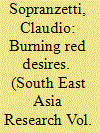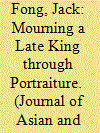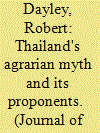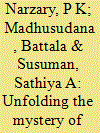| Srl | Item |
| 1 |
ID:
117062


|
|
|
|
|
| Publication |
2012.
|
| Summary/Abstract |
The Red Shirt movement, which reached its peak during May 2010, has been met with puzzlement and ambiguity by media and scholars in and beyond Thailand. Often presented as a one-man-driven movement or a 'peasant revolt', the movement has remained opaque to many observers. This article analyses the ongoing conflict through the eyes of Isan (North Eastern Thai) migrants in Bangkok, especially motorcycle taxi drivers, as motivated by 'politics of desire'. In particular, the article explores how desires for consumption are voiced by a new emerging regional middle class with a diffuse feeling of being stuck between an agricultural past and a self-employed present, due to structural limitations on social and personal development. The author examines the historical emergences and failures of these desires in a complex web of conflicting and overlapping claims to representation, capitalism and class mobility. Positioning desires at the core of the analysis and exploring their configuration and suppression in Thailand through discourses of capitalist access, self-sufficiency and social justice allows severed links to be recovered and apparent contradictions to be reconfigured. This seems necessary to understand the otherwise disconnected and incomprehensible economic, discursive and spatial dimensions of the Thai political conflict.
|
|
|
|
|
|
|
|
|
|
|
|
|
|
|
|
| 2 |
ID:
164384


|
|
|
|
|
| Summary/Abstract |
This article employs an urban sociological reading to examine mourning portraiture in the primate city of Bangkok, Thailand, following the death of King Bhumibol Adulyadej (Rama IX). The article argues that Bangkok’s mourning portraiture constructs a reified notion of the Thai nation acceptable to Bangkok’s elites. Through a narrative that sacralizes the late king’s historical exploits for the Thai people, Bangkok’s elites have harnessed the affluent shopping district of Pathum Wan as an aesthetic and political canvas for showcasing the transcendent and virtuous nature of their late monarch. With mourning portraiture as figure and Bangkok’s Pathum Wan as background, the nationalist implications of the imagery as they render sacred the late monarch are considered. The article concludes that the capital city’s sacralization of a deceased king is but an attempt by pro-royalist banking families to reinforce their class linkages to the Thai aristocracy by ‘working towards the monarchy,’ a trajectory illuminated by Serhat Ünaldi, one which I hope to make visible in the post-death context of mourning Rama IX.
|
|
|
|
|
|
|
|
|
|
|
|
|
|
|
|
| 3 |
ID:
092635


|
|
|
| 4 |
ID:
108493


|
|
|
|
|
| Publication |
2011.
|
| Summary/Abstract |
Thailand's agrarian myth holds that culturally-based, small-scale subsistence farming is the most desirable form of community life for rural Thais. This article outlines Thailand's agrarian myth and argues that its current promotion finds support in an obsolete 'sufficiency ethic', rather than from the country's pragmatically-oriented farmers. Proponents of this myth come from Thailand's cultural and bureaucratic elite, urban intellectuals, and religious fundamentalists. Based on field research and secondary sources the article demonstrates how the attitudes and behaviors of contemporary Thai farmers belie the agrarian myth which non-farming elites now advocate. The article concludes that yellow-shirted proponents of Sufficiency Economy, Community Culture, and austere Buddhist fundamentalism should adjust their vision to the reality that Thailand's forward-looking farmers desire a rural lifestyle beyond the agrarian myth.
|
|
|
|
|
|
|
|
|
|
|
|
|
|
|
|
| 5 |
ID:
155167


|
|
|
|
|
| Summary/Abstract |
Reliance on traditional methods of birth control causes psychological tension in couples because the fear of unwanted pregnancy bars them from experiencing a healthy sexual life. However, in Assam, half of all contraceptive users depend on traditional methods of birth control. The current study used National Family Health Survey 2005–2006 data. Out of 3840 sample women in the age group 15–49 years, 1286 women are filtered for the present study. Most of the demographic and socioeconomic characteristics of traditional method users fall between those of modern spacing method users and terminal method users. Thus, the burden of unwanted fertility is highest among the traditional method users.
|
|
|
|
|
|
|
|
|
|
|
|
|
|
|
|